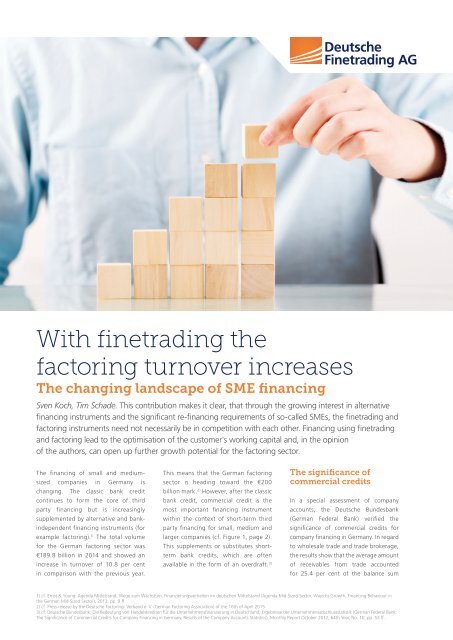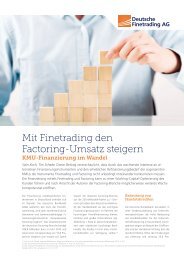With finetrading the factoring turnover increases
Factoring and finetrading
Factoring and finetrading
Create successful ePaper yourself
Turn your PDF publications into a flip-book with our unique Google optimized e-Paper software.
<strong>With</strong> <strong>finetrading</strong> <strong>the</strong><br />
<strong>factoring</strong> <strong>turnover</strong> <strong>increases</strong><br />
The changing landscape of SME financing<br />
Sven Koch, Tim Schade. This contribution makes it clear, that through <strong>the</strong> growing interest in alternative<br />
financing instruments and <strong>the</strong> significant re-financing requirements of so-called SMEs, <strong>the</strong> <strong>finetrading</strong> and<br />
<strong>factoring</strong> instruments need not necessarily be in competition with each o<strong>the</strong>r. Financing using <strong>finetrading</strong><br />
and <strong>factoring</strong> lead to <strong>the</strong> optimisation of <strong>the</strong> customer's working capital and, in <strong>the</strong> opinion<br />
of <strong>the</strong> authors, can open up fur<strong>the</strong>r growth potential for <strong>the</strong> <strong>factoring</strong> sector.<br />
The financing of small and mediumsized<br />
companies in Germany is<br />
changing. The classic bank credit<br />
continues to form <strong>the</strong> core of third<br />
party financing but is increasingly<br />
supplemented by alternative and bankindependent<br />
financing instruments (for<br />
example <strong>factoring</strong>). 1) The total volume<br />
for <strong>the</strong> German <strong>factoring</strong> sector was<br />
€189.8 billion in 2014 and showed an<br />
increase in <strong>turnover</strong> of 10.8 per cent<br />
in comparison with <strong>the</strong> previous year.<br />
This means that <strong>the</strong> German <strong>factoring</strong><br />
sector is heading toward <strong>the</strong> €200<br />
billion mark. 2) However, after <strong>the</strong> classic<br />
bank credit, commercial credit is <strong>the</strong><br />
most important financing instrument<br />
within <strong>the</strong> context of short-term third<br />
party financing for small, medium and<br />
larger companies (cf. Figure 1, page 2).<br />
This supplements or substitutes shortterm<br />
bank credits, which are often<br />
available in <strong>the</strong> form of an overdraft. 3)<br />
The significance of<br />
commercial credits<br />
In a special assessment of company<br />
accounts, <strong>the</strong> Deutsche Bundesbank<br />
(German Federal Bank) verified <strong>the</strong><br />
significance of commercial credits for<br />
company financing in Germany. In regard<br />
to wholesale trade and trade brokerage,<br />
<strong>the</strong> results show that <strong>the</strong> average amount<br />
of receivables from trade accounted<br />
for 25.4 per cent of <strong>the</strong> balance sum<br />
1) cf. Ernst & Young: Agenda Mittelstand, Wege zum Wachstum, Finanzierungsverhalten im deutschen Mittelstand (Agenda Mid-Sized Sector, Ways to Growth, Financing Behaviour in<br />
<strong>the</strong> German Mid-Sized Sector), 2013, pp. 9 ff.<br />
2) cf. Press release by <strong>the</strong> Deutsche Factoring- Verband e. V. (German Factoring Association) of <strong>the</strong> 16th of April 2015.<br />
3) cf. Deutsche Bundesbank: Die Bedeutung von Handelskrediten für die Unternehmensfinanzierung in Deutschland, Ergebnisse der Unternehmensabschlussstatistik (German Federal Bank:<br />
The Significance of Commercial Credits for Company Financing in Germany, Results of <strong>the</strong> Company Accounts Statistics), Monthly Report October 2012, 64th Year, No. 10, pp. 53 ff.
Figure 1: Average amount of commercial credits from 2002 to 2009 according to<br />
economic sector in millions of Euro (left) and percent of <strong>the</strong> balance sum (right) 5)<br />
Manufacturing<br />
Wholesale and<br />
trade brokerage<br />
Retail<br />
Business support<br />
services<br />
Construction<br />
Sale and repair<br />
of vehicles<br />
Transport<br />
excluding rail<br />
0 20 40 60 80 100 120 140<br />
Manufacturing<br />
Wholesale and<br />
trade brokerage<br />
Retail<br />
Business support<br />
services<br />
Construction<br />
Sale and repair<br />
of vehicles<br />
Transport<br />
excluding rail<br />
0 5 10 15 20 25 30<br />
Source: Deutsche Bundesbank (German<br />
Federal Bank)<br />
Accounts payable from trade<br />
Receivables from trade<br />
(€62.6 billion) and <strong>the</strong> average amount<br />
of liabilities from trade accounted for<br />
18.5 percent of <strong>the</strong> balance sum (€45.4<br />
billion) and varied greatly depending on<br />
<strong>the</strong> sector of industry and <strong>the</strong> size of <strong>the</strong><br />
company (Figure 1).<br />
Moreover, <strong>the</strong> results show that trade<br />
credits are of particular importance<br />
to very small, small and medium-sized<br />
companies as well as companies with<br />
high sales costs. 4)<br />
The result of <strong>the</strong> Atradius Payment<br />
Behaviour Barometer survey confirmed<br />
an average payment period of 43 days for<br />
<strong>the</strong> German business sector. In total, 65.2<br />
per cent of <strong>the</strong> companies surveys stated<br />
a payment period of between zero and<br />
30 days, 21.7 per cent stated a payment<br />
period of between 31 and 60 days and<br />
around 13 per cent stated a period of<br />
more than 60 days.<br />
Terms of payment and<br />
payment behaviour<br />
The current results on payment<br />
behaviour indicate what is often<br />
insufficient liquidity, as 33.7 per cent of<br />
<strong>the</strong> entire volume of receivables were<br />
not paid by <strong>the</strong> date on which <strong>the</strong> invoice<br />
was due for payment and were overdue<br />
by an average of 13 days. A delay in<br />
payment can be identified in particular<br />
in <strong>the</strong> areas of SMEs and <strong>the</strong> production<br />
and retail sectors. According to <strong>the</strong><br />
information provided by <strong>the</strong> companies<br />
surveyed, 50.6 per cent use <strong>the</strong> delay in<br />
payment targets for short-term financing<br />
of <strong>the</strong> working capital. It is <strong>the</strong>refore no<br />
surprise that <strong>the</strong> greatest challenges<br />
include ensuring sufficient liquidity (24.4<br />
per cent) and <strong>the</strong> risk of non-payment in<br />
connection with collection procedures<br />
regarding open accounts (29.6 per cent). 6)<br />
The law passed by <strong>the</strong> German Bundestag<br />
to combat delayed payment to protect<br />
medium-sized companies emphasised<br />
<strong>the</strong> framework conditions for financing<br />
on <strong>the</strong> commercial credit market, in<br />
particular payment behaviour and<br />
resulting challenges for vendors and<br />
creditors. 7)<br />
The framework conditions outlines lead<br />
to an enormous re-financing requirement<br />
for <strong>the</strong> financing of SMEs on <strong>the</strong> part<br />
of <strong>the</strong> company as well as <strong>the</strong> need for<br />
professional management of creditors and<br />
debtors as well as liquidity management.<br />
This suggests significant potential for<br />
growth for <strong>the</strong> <strong>finetrading</strong> and <strong>factoring</strong><br />
financing instruments.<br />
Growth potential<br />
The current deficit in demand for (shortterm)<br />
bank credits, which among o<strong>the</strong>r<br />
things is attributable to a changed<br />
source of funds in favour of internal<br />
financing and innovative working<br />
capital management, streng<strong>the</strong>ns this<br />
assumption. 8) Innovative working capital<br />
management includes, among o<strong>the</strong>r<br />
things, <strong>the</strong> optimisation of payment<br />
targets on <strong>the</strong> sales and purchasing<br />
sides in cooperation with customers and<br />
suppliers. 9)<br />
This article shows that, due to <strong>the</strong><br />
growing interest in alternative financing<br />
instruments and <strong>the</strong> huge re-financing<br />
requirements of SMEs, <strong>the</strong> <strong>finetrading</strong><br />
and <strong>factoring</strong> financing instruments are<br />
not competitors but ra<strong>the</strong>r complement<br />
each o<strong>the</strong>r. Double-sided financing<br />
using <strong>finetrading</strong> and <strong>factoring</strong> leads<br />
to <strong>the</strong> optimisation of <strong>the</strong> customer's<br />
working capital and enables <strong>the</strong><br />
<strong>factoring</strong> sector to exploit fur<strong>the</strong>r<br />
growth potential, in order to continue<br />
on this growth path in <strong>the</strong> coming years.<br />
Factoring versus<br />
<strong>finetrading</strong><br />
In <strong>the</strong> case of financing for mediumsized<br />
companies, <strong>the</strong> <strong>factoring</strong> financing<br />
instrument is considered to be established.<br />
It is used to finance trade receivables and<br />
is not a financial service according to <strong>the</strong><br />
German Banking Act (KWG), because all<br />
ongoing purchase of receivables is defined<br />
on <strong>the</strong> basis of framework contracts with<br />
or without recourse. 10) Therefore, it is not<br />
possible to exploit <strong>the</strong> high share from<br />
2<br />
4) cf. Deutsche Bundesbank: Die Bedeutung von Handelskrediten für die Unternehmensfinanzierung in Deutschland, Ergebnisse der Unternehmensabschlussstatistik (German Federal<br />
Bank: The Significance of Commercial Credits for Company Financing in Germany, Results of <strong>the</strong> Company Accounts Statistics), Monthly Report October 2012, 64th Year, No. 10, pp. 57<br />
5) taken from Deutsche Bundesbank: Die Bedeutung von Handelskrediten für die Unternehmensfinanzierung in Deutschland, Ergebnisse der Unternehmensabschlussstatistik (German<br />
Federal Bank: The Significance of Commercial Credits for Company Financing in Germany, Results of <strong>the</strong> Company Accounts Statistics), Monthly Report October 2012, 64th Year, No. 10,<br />
pp. 59. The amount of <strong>the</strong> receivables and liabilities from commercial credits and deposits by listed non-financial companies has fur<strong>the</strong>r increased since 2009, cf. Deutsche Bundesbank<br />
(German Federal Bank), time series BBK01.CEFY01 and BBK01.CEFY10, as of 03 February 2015.<br />
6) cf. Atradius Payment Practices Barometer: International Survey of B2B Payment Behaviour, Survey Results for Germany, Spring 2014, pp. 1 ff.<br />
7) cf. Gesetz zur Bekämpfung von Zahlungsverzug im Geschäftsverkehr (Law to Combat Delayed Payment in Business), Federal Law Gazette 2014, Part I No. 35, published in Bonn on<br />
28 July 2014, pp. 1218. For fur<strong>the</strong>r notes on <strong>the</strong> effects on financing practice cf. Krüger, Gesetz zur Bekämpfung von Zahlungsverzug im Geschäftsverkehr, Finanzierung Leasing Factoring<br />
(Law to Combat Delayed Payment in Business, Financing Leasing Factoring), 6/2014, pp. 23.<br />
8) cf. Deutsche Bundesbank: Geldpolitik und Bankgeschäft (German Federal Bank: Monetary Policy and Banking), Monthly Report November 2014, 66th Year, No. 11, pp. 38 ff. and Deutsche Bundesbank<br />
(German Federal Bank), time series BBK01.OXA8C4, as of 03 February 2015.<br />
9) cf. Deloitte & Touche: Working-Capital-Studie, Flüssige Mittel und gebundenes Kapital (Working Capital Study: Liquid Funds and Committed Capital), 4/2014, pp. 7, 13.
liabilities from trade on <strong>the</strong> liabilities<br />
side for SMEs using <strong>factoring</strong> (Figure 1).<br />
SMEs use commercial credits to finance<br />
working capital. Repayment often does<br />
not occur on <strong>the</strong> defined maturity date.<br />
It can be assumed from this that SMEs<br />
need longer payment targets. <strong>With</strong>in <strong>the</strong><br />
context of sales financing, <strong>factoring</strong> sets<br />
individual payment targets and protects<br />
<strong>the</strong> customer by assuming <strong>the</strong> default<br />
risk (del credere function) and with<br />
debtor management (service function) for<br />
receivables defaults. On <strong>the</strong> right, Figure<br />
2 shows how sales financing works using<br />
<strong>factoring</strong>.<br />
Here, <strong>the</strong> <strong>finetrading</strong> financing instrument<br />
is of interest, because from <strong>the</strong> <strong>factoring</strong><br />
perspective, <strong>the</strong> supplier of <strong>the</strong> <strong>finetrading</strong><br />
transaction facilitates <strong>the</strong> transformation<br />
of <strong>the</strong> liabilities from trade into factorable<br />
receivables from trade and provides <strong>the</strong><br />
customer with extended payment targets<br />
against a deferral charge.<br />
The less well-known and <strong>the</strong>refore not<br />
yet established <strong>finetrading</strong> financial<br />
instrument is a financial drop shipping<br />
transaction and is, as a rule, offered<br />
by bank-independent companies<br />
(finetraders). In contrast to <strong>factoring</strong>,<br />
a finetrader is not a credit or financial<br />
services institution according to <strong>the</strong><br />
German Banking Act (KWG). The<br />
<strong>finetrading</strong> business is <strong>the</strong>refore not<br />
a business subject to authorisation in<br />
accordance with <strong>the</strong> German Banking Act<br />
(KWG) or to o<strong>the</strong>r regulations, so that<br />
for finetraders <strong>the</strong>re is no supervisory<br />
obligation by <strong>the</strong> German Federal<br />
Financial Supervisory Authority (BaFin).<br />
The <strong>finetrading</strong> business includes <strong>the</strong><br />
processing of commercial through <strong>the</strong><br />
provision of supplier credits with a volume<br />
of up to €15 million and a payment term<br />
of up to 120 days.<br />
Thus, <strong>finetrading</strong> is used to flexibly<br />
finance <strong>the</strong> purchase of goods, whereby<br />
<strong>the</strong> finetrade takes over <strong>the</strong> advance<br />
financing of tradable goods purchases by<br />
<strong>the</strong> customer. A fee applied for availing<br />
of <strong>finetrading</strong>, which is generally covered<br />
by <strong>the</strong> discount in <strong>the</strong> case of a term of<br />
payment of up to 30 days. 12) Around 65<br />
per cent of <strong>the</strong> receivables with a term of<br />
payment have a term of between zero and<br />
30 days. Therefore, <strong>finetrading</strong> can be a<br />
cost-efficient alternative form of financing<br />
for SMEs. It is to be determined that this<br />
financial instrument is an alternative to<br />
substantial commercial credit or shortterm<br />
bank credit. On <strong>the</strong> left, Figure 2<br />
shows how financing for <strong>the</strong> purchase of<br />
goods works using <strong>finetrading</strong>.<br />
Reverse Factoring<br />
In addition to <strong>finetrading</strong>, <strong>the</strong> <strong>factoring</strong><br />
variant, reverse <strong>factoring</strong>, presents a<br />
fur<strong>the</strong>r option for financing <strong>the</strong> purchase<br />
of goods. Reverse <strong>factoring</strong> is a suitable<br />
financial instrument for large companies<br />
because, as it is less flexible in regard<br />
to <strong>the</strong> customer's frequently changing<br />
supplier relationships, it is often <strong>the</strong><br />
case that only large purchase volumes<br />
are financed and a relatively powerful<br />
market position in comparison with o<strong>the</strong>r<br />
suppliers can be advantageous.<br />
Fur<strong>the</strong>rmore, in <strong>the</strong> case of reverse<br />
<strong>factoring</strong>, receivables are purchased<br />
from <strong>the</strong> supplier by <strong>the</strong> factor, so that<br />
<strong>the</strong> liabilities from trade remain with <strong>the</strong><br />
customer. 13) In <strong>the</strong> case of <strong>the</strong> combined<br />
use of <strong>finetrading</strong> and <strong>factoring</strong>, <strong>the</strong><br />
growth potential from <strong>the</strong> asset/liability<br />
sides for a joint customer should be<br />
exploited.<br />
Combination to<br />
increase revenue<br />
Figure 3 shows <strong>the</strong> combined use of<br />
<strong>the</strong> <strong>finetrading</strong> and <strong>factoring</strong> financial<br />
instruments. This is a suitable financing<br />
combination for SMEs with good credit<br />
ratings, which display "healthy" business<br />
processes and are subject to potentially<br />
seasonal business.<br />
Fur<strong>the</strong>rmore, <strong>the</strong> companies have short<br />
terms of payment (30 days) on <strong>the</strong><br />
purchasing side and cannot avail of<br />
supplier credits or discount allowances<br />
by paying within <strong>the</strong> discount period. In<br />
addition, <strong>the</strong> liquidity of <strong>the</strong>se companies<br />
is encumbered with high capital<br />
commitments regarding warehouse stock.<br />
Figure 2: Financing procedures with <strong>finetrading</strong> and <strong>factoring</strong> 11)<br />
1 Negotiation and terms<br />
7.1 Negotiation and terms of sale<br />
Suppliers 4.1 Customer Recipient<br />
Delivery of goods and controls<br />
7.2 Delivery and invoicing<br />
3 Ordering at <strong>the</strong> behest of <strong>the</strong> customer<br />
4.2 Invoicing with a discount agreement<br />
6 Immediate payment after delivery<br />
within <strong>the</strong> discount period<br />
2<br />
5<br />
9<br />
Ordering according to terms<br />
Payment approval<br />
Repayment of <strong>the</strong><br />
supplier liability<br />
immediately after<br />
liquidity is received<br />
8.1 Sale on demand<br />
8.2 Immediate payment<br />
up to 100%<br />
Payment of <strong>the</strong> invoice according<br />
to <strong>the</strong> term of payment<br />
Finetrader<br />
Factor<br />
10) cf. Sec. 1 para. 1a No. 9 KWG (German Banking Act).<br />
11) Following Koch, Finetrading versus Reverse Factoring: Fremdfinanzierungsinstrumente zur Working-Capital-Optimierung (Finetrading Versus Reverse Factoring: Third Party Financing<br />
Instruments to Optimise Working Capital), Corporate Finance, 11/2014, pp. 462.<br />
12) cfl. Perridon/Steiner/Rathgeber, Finanzwirtschaft der Unternehmung (Company Financial Management), Munich, 16th Edition, 2012, pp. 456. For a financial assessment cf. Koch,<br />
Finetrading versus Reverse Factoring: Fremdfinanzierungsinstrumente zur Working-Capital-Optimierung (Finetrading Versus Reverse Factoring: Third Party Financing Instruments to<br />
Optimise Working Capital), Corporate Finance, 11/2014, pp. 461 f.<br />
13) cf. Koch, Finetrading versus Reverse Factoring: Fremdfinanzierungsinstrumente zur Working-Capital-Optimierung (Finetrading Versus Reverse Factoring: Third Party Financing Instruments<br />
to Optimise Working Capital), Corporate Finance, 11/2014, pp. 463 ff. 3
Figure 3: Structure of <strong>the</strong> combined financing through <strong>finetrading</strong> and <strong>factoring</strong> 14)<br />
1 Negotiation and terms<br />
7.1 Negotiation and terms of sale<br />
Suppliers 4.1 Customer 7.2<br />
Recipient<br />
Delivery of goods and controls<br />
Delivery and invoicing<br />
3 Ordering at <strong>the</strong> behest of <strong>the</strong> customer<br />
4.2 Invoicing with a discount agreement<br />
6.1<br />
Immediate payment after delivery<br />
within <strong>the</strong> discount period<br />
2<br />
5<br />
Ordering according to terms<br />
Payment approval<br />
8.1 Sale on demand<br />
8.2 Repayment of <strong>the</strong> <strong>finetrading</strong><br />
receivable after <strong>the</strong><br />
liquidity flow (immediate)<br />
through <strong>factoring</strong><br />
Payment of <strong>the</strong> invoice according<br />
to <strong>the</strong> term of payment<br />
Finetrader<br />
6.2<br />
6.3<br />
Sale of <strong>the</strong> receivables against<br />
customers (initiator)<br />
Immediate payment of <strong>the</strong><br />
purchase price<br />
Factor<br />
Factoring Contract<br />
On <strong>the</strong> sales side, <strong>the</strong>se companies show<br />
long terms of payment (up to 120 days)<br />
and thus a corresponding difference<br />
between invoicing and payment of <strong>the</strong><br />
receivables.<br />
However, in <strong>the</strong> case of combined use in<br />
accordance with Figure 3, <strong>the</strong> exclusion of<br />
double financing for "one item" must be<br />
contractually ensured. The customer must<br />
use <strong>the</strong> liquidity gained from <strong>the</strong> <strong>factoring</strong><br />
transaction to immediately repay <strong>the</strong><br />
liability to <strong>the</strong> finetrader because<br />
o<strong>the</strong>rwise <strong>factoring</strong> is not possible.<br />
From <strong>the</strong> perspective of <strong>the</strong> factor, <strong>the</strong><br />
finetrade acts as a special purpose vehicle,<br />
which enables <strong>the</strong> transformation of <strong>the</strong><br />
factorability of <strong>the</strong> customer's liabilities<br />
from trade into factorable receivables<br />
from trade. In <strong>the</strong> case of <strong>factoring</strong>, <strong>the</strong><br />
receivables from deliveries and services<br />
do not have to be verified again, as a<br />
comprehensive check regarding <strong>the</strong> legal<br />
validity of <strong>the</strong> receivables has already<br />
been carried out by <strong>the</strong> finetrader.<br />
From <strong>the</strong> perspective of <strong>the</strong> finetrader<br />
necessary re-financing is ensured through<br />
<strong>the</strong> sale of receivables to <strong>the</strong> factor,<br />
which executes immediate full payment<br />
of <strong>the</strong> receivable. The finetrader does<br />
not require any fur<strong>the</strong>r credit lines for <strong>the</strong><br />
<strong>finetrading</strong> transaction, as a financially<br />
strong factor takes over <strong>the</strong> re-financing.<br />
If <strong>the</strong> finetrader and <strong>the</strong> factor are two<br />
companies within a group, dual financing<br />
of a customer is ensured from one source.<br />
For <strong>the</strong> finetrader, <strong>the</strong> joint financing of<br />
one customer results in potentially better<br />
re-financing terms. In <strong>the</strong> case of groupindependent<br />
cooperation between <strong>the</strong><br />
finetrader and <strong>the</strong> factor, bulk business<br />
can lead to more favourable conditions<br />
for <strong>the</strong> finetrader. In <strong>the</strong> case of a<br />
group-internal cooperation between <strong>the</strong><br />
companies, in addition to bulk business,<br />
if <strong>the</strong> group has a strong equity basis<br />
<strong>the</strong> re-financing terms can be optimised.<br />
Financing costs<br />
Form <strong>the</strong> perspective of <strong>the</strong> customer,<br />
financing costs are incurred through<br />
<strong>the</strong> combined use of <strong>finetrading</strong> and<br />
<strong>factoring</strong> in connection with <strong>the</strong> duration<br />
of <strong>the</strong> capital commitment, <strong>the</strong> creditworthiness<br />
of <strong>the</strong> customer and <strong>the</strong><br />
business volume. In <strong>the</strong> case of SMEs,<br />
<strong>the</strong>se lead to a potential acceptance, if<br />
this can be measured in terms of average<br />
financing costs or fur<strong>the</strong>r financial or<br />
distributional advantages are created.<br />
A study by <strong>the</strong> consulting company,<br />
Ernst & Young on financing in <strong>the</strong><br />
German mid-sized sector confirmed that<br />
<strong>the</strong> cost of financing tends to fade into<br />
<strong>the</strong> background and that liquidity and<br />
financing security are in <strong>the</strong> foreground. 15)<br />
Advantages<br />
Trade credit is dominant in <strong>the</strong><br />
case of small and medium-sized<br />
companies regarding short-term third<br />
party financing. The <strong>finetrading</strong> and<br />
<strong>factoring</strong> financing instruments are<br />
financing solutions for <strong>the</strong> purchasing<br />
and sales sides of a company and<br />
represent alternative supplements to<br />
trade credit. By using <strong>the</strong> <strong>finetrading</strong><br />
and <strong>factoring</strong> financing instruments,<br />
economic advantages are created for<br />
<strong>the</strong> customer from which company<br />
growth can be generated. In <strong>the</strong> case<br />
of combined use of <strong>the</strong> instruments,<br />
<strong>finetrading</strong> makes <strong>the</strong> factorability of<br />
<strong>the</strong> customer's liabilities side possible.<br />
Here, <strong>the</strong> exclusion of double financing<br />
for "one item" must be ensured. For <strong>the</strong><br />
<strong>factoring</strong> sector, <strong>the</strong> growth potential<br />
that is already high is increased through<br />
<strong>the</strong> cooperation, because in addition to<br />
<strong>the</strong> existing receivables from trade, <strong>the</strong>re<br />
is access to <strong>the</strong> equally high liabilities<br />
from trade. Both business models show<br />
fur<strong>the</strong>r growth potential.<br />
From <strong>the</strong> perspective of <strong>the</strong> factor <strong>the</strong><br />
cooperation leads to additional growth<br />
potential and greater customer loyalty,<br />
from <strong>the</strong> perspective of <strong>the</strong> finetrader<br />
<strong>the</strong> cooperation guarantees re-financing.<br />
In <strong>the</strong> case of group-independent<br />
companies, <strong>the</strong>re is <strong>the</strong> option of<br />
generating revenue from services in <strong>the</strong><br />
form of commission payments.<br />
Source: Sven Koch, Tim Schade, FLF 3/2015<br />
4<br />
14) Following Koch, Finetrading versus Reverse Factoring: Fremdfinanzierungsinstrumente zur Working-Capital-Optimierung (Finetrading Versus Reverse Factoring: Third Party Financing<br />
Instruments to Optimise Working Capital), Corporate Finance, 11/2014, pp. 462.





